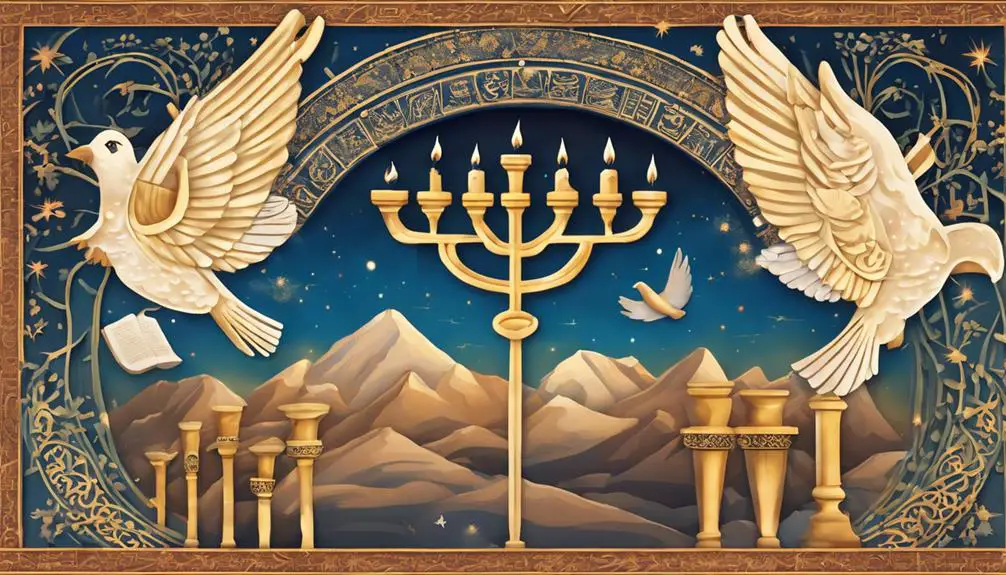Grasp the profound symbolism of the number 5 in biblical narratives, revealing layers of grace and redemption that beckon further exploration.

Significance of 5 in the Bible
Have you ever pondered why the number 5 recurrently appears in pivotal biblical narratives?
From the Pentateuch laying the foundation of faith to the five loaves feeding thousands, this digit carries a weight that's hard to overlook.
You'll find that David didn't just randomly choose five stones to face Goliath, nor did the early church structure itself by chance into a five-fold ministry.
These instances hint at a deeper symbolism tied to grace and redemption, a quintuple representation that beckons further exploration.
Uncover the layers behind this enigmatic figure and its profound impact on biblical teachings and perhaps, uncover something about your own journey of faith.
Key Takeaways
- The Pentateuch, as the first 5 books, is foundational to Judaic-Christian faith, symbolizing a covenantal relationship with God.
- Five loaves in the miracle of provision represent abundance and faith's growth through divine support.
- David's choice of 5 stones against Goliath underscores faith's victory over seemingly insurmountable challenges.
- The Five-Fold Ministry outlines essential roles for a balanced and effective Christian community, promoting spiritual growth and leadership.
The Pentateuch: Foundation of Faith

The Pentateuch, comprising the first five books of the Bible, serves as the cornerstone of Judaic-Christian faith, intricately weaving history, law, and theology to guide believers' understanding and practice. Traditionally attributed to Mosaic authorship, these texts not only recount the origins of the universe and humanity but also establish a covenantal relationship between God and His people, highlighted by the giving of the Law at Sinai. This attribution to Moses has profound implications for how you, as a believer or scholar, approach the text, suggesting a direct link between divine revelation and the legal and moral frameworks within.
Your exploration into the Pentateuch reveals a complex interplay of Law interpretations, reflecting the dynamic nature of religious practice and belief. These interpretations have evolved, accommodating the changing contexts of Jewish and Christian communities while maintaining fidelity to the foundational narratives. Understanding the Pentateuch through the lens of Mosaic authorship enriches your grasp of its authority and sanctity, positioning these texts as a living document that continues to speak powerfully into the lives of the faithful. This scholarly journey uncovers the intricate layers of meaning and the pivotal role of the Pentateuch in shaping the theological contours of Judaic-Christian tradition.
Five Loaves: Miraculous Provision

Exploring further the significance of the number five in biblical narratives, the account of Jesus feeding the multitude with five loaves underscores a profound theme of divine provision and abundance. This miracle isn't just a demonstration of Christ's power over the physical realm but also a rich symbol layered with meaning, especially when you delve into the multiplication symbolism and the growth of the disciples' faith.
Let's break down the significance of this event:
- Symbol of Abundance: The five loaves signify not just physical sustenance but the overflowing spiritual nourishment that Jesus provides. It's a testament to the idea that what's given to God, no matter how small, can be multiplied to meet not just the need, but abundantly so.
- Multiplication Symbolism: This act of multiplying the loaves represents God's endless ability to provide and the boundless nature of His grace.
- Test of Faith: The disciples were skeptical at first, questioning how such a small amount could feed so many. This moment served as a pivotal lesson in trusting God's provision.
- Growth in Faith: Witnessing this miracle firsthand significantly impacted the disciples' faith, reinforcing their understanding of Jesus' divine nature and His teaching about relying on God's provision.
David's Five Stones: Triumph of Faith

In the biblical narrative, David's selection of five stones before his battle with Goliath stands as a profound emblem of faith's triumph over seemingly insurmountable challenges. This act isn't merely a tactical decision; it's a deeply symbolic gesture underscoring the shepherd's bravery and unwavering belief in divine assistance. You see, each stone David chose could be seen as representing more than just ammunition against a formidable foe; they symbolize the spiritual resources available to those who dare to confront their Goliaths with faith.
The moment David stepped onto the battlefield with those five stones, he wasn't just a young shepherd facing a giant; he embodied the triumph of faith over fear, of spiritual might over physical prowess. Goliath's downfall was inevitable not because of the physical stones, but because of what they represented: faith, courage, and the conviction that with God's help, even the mightiest obstacles can be overcome.
David's victory serves as a powerful reminder that faith, symbolized by the seemingly insignificant stones, can lead to extraordinary outcomes. The shepherd's bravery, armed with faith's quintessence, turned what seemed an impossible battle into a testament to faith's triumph.
The Five-Fold Ministry: Church's Structure

Ephesians 4:11-12 lays the foundation for understanding the five-fold ministry, a blueprint for church leadership and spiritual growth that's essential for nurturing a healthy, dynamic Christian community. This structure, rooted in spiritual gifts, plays a pivotal role in the church's mission and governance, emphasizing the diversity and unity within the body of Christ.
Analyzing the composition of the five-fold ministry reveals:
- Apostles – They lay the foundations, pioneering new spiritual territories and establishing churches. Their role is foundational, reflecting a strategic leadership capacity that guides the church's direction and expansion.
- Prophets – They serve as the church's spiritual radar, offering guidance, correction, and revelation. Their insights ensure the community remains aligned with God's will, fostering a deep sense of spiritual awareness.
- Evangelists – Charged with spreading the Gospel, they're the church's outreach arm, bringing in new believers. Their passion for salvation drives the church's growth, both spiritually and numerically.
- Pastors and Teachers – These roles often overlap, focusing on nurturing, teaching, and protecting the flock. They provide the daily leadership and instruction essential for believers' growth and maturity.
Understanding these leadership roles highlights the strategic implementation of spiritual gifts within the church, ensuring a balanced, effective approach to ministry and community life.
Grace and Redemption: A Quintuple Representation

While examining the biblical concept of grace and redemption, it's pivotal to recognize their quintuple representation, which significantly enriches our understanding of divine mercy and salvation. This quintuple representation is most vividly seen through the lens of the five sacrifices outlined in the Old Testament, each symbolizing different aspects of redemption and atonement. These sacrifices, as redemption symbols, collectively underscore the multifaceted nature of grace and the extensive lengths to which divine love goes to restore humanity.
The number five, thus, doesn't merely serve as a numeral in biblical lore but as a profound emblem of God's grace and the redemption process. Each of the five sacrifices—burnt offerings, grain offerings, peace offerings, sin offerings, and guilt offerings—represents a distinct dimension of repentance, reconciliation, and restoration. They prefigure the ultimate sacrifice of Jesus Christ, embodying the fullness of grace and redemption for all mankind.
Frequently Asked Questions
How Does the Number 5 Relate to the Creation Story in Genesis, and What Significance Does It Hold There?
In Genesis, the number 5 doesn't directly relate to the creation days, but it's symbolic in the broader biblical context. You'll find its significance in the Pentateuch structure, which embodies the Torah's first five books.
This reflects a foundational element in biblical narratives. Analyzing deeper, you won't see a direct link to creation days, but understanding the Pentateuch's role offers insightful perspectives on its symbolic relevance, embedding a layer of scholarly interpretation to the scriptures.
In What Ways Does the Number 5 Symbolize Protection or Guidance in Biblical Narratives Outside the Commonly Referenced Stories?
In exploring biblical narratives, you'll find the number 5 symbolizes protection or guidance in nuanced ways.
For instance, the Pentateuch's structure, encompassing five books, serves as a foundational guide for faith and moral conduct.
Similarly, David's selection of five stones before battling Goliath isn't random; it subtly underscores divine protection and the sufficiency of God's provision in overcoming giants.
These examples reflect a deeper, symbolic layer of interpretation and meaning.
Are There Any Lesser-Known Biblical Characters or Events Associated With the Number 5 That Carry Deep Theological or Symbolic Meaning?
Exploring lesser-known narratives, you'll find that like threads in a tapestry, the number 5 weaves through biblical stories with subtlety. Consider the Five Plagues, less spotlighted yet profoundly impactful, symbolizing judgment with precision.
Then, there's the phenomenon of Quintuple Dreams, offering layers of insight into divine guidance. These elements, though not as prominent, enrich your understanding, providing a nuanced perspective on how numbers carry deep, symbolic resonance in biblical texts.
How Does the Concept of the Number 5 Manifest in the Prophetic Books of the Bible, and What Implications Does That Have for Understanding Prophecy?
In the prophetic books, the number 5 often emerges as a significant pattern, playing into broader themes of grace and preparation.
You'll find it's not just a number, but a symbol that intricately weaves through prophetic narratives, offering deep insight into the text's meaning.
These number patterns serve as prophetic symbols, enhancing your understanding of prophecy and its implications, encouraging a more nuanced interpretation of these ancient writings.
Can the Significance of the Number 5 Be Traced in the Genealogies Recorded in the Bible, and if So, What Does It Reveal About God's Plan or Character?
You'll find that the Bible's genealogies hold intriguing numerical patterns, especially concerning the number 5. These patterns aren't just coincidental; they reveal much about God's plan and character.
Conclusion
In the tapestry of biblical narrative, the number five emerges as a profound allegory for humanity's journey towards divine grace. Like the Pentateuch laying the bedrock of faith, or David's singular stone defeating Goliath, it symbolizes our potential for triumph through belief.
The five loaves and the Five-Fold Ministry reflect the sustenance and structure provided by faith. Through these quintuple representations, we see a mirrored reflection of grace and redemption, a testament to the intricate design woven by the Divine.



Sign up